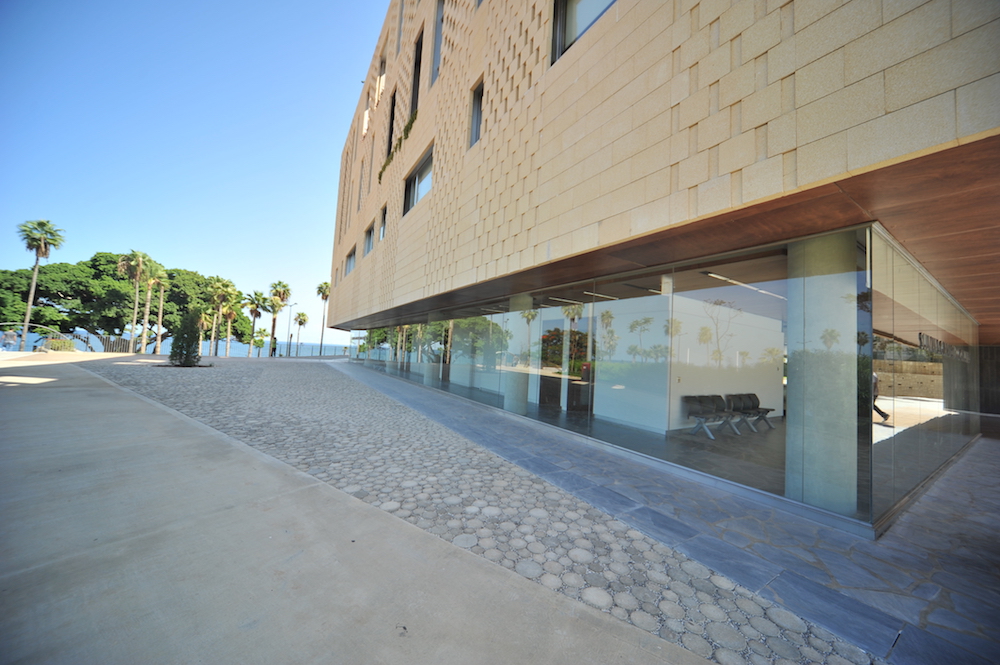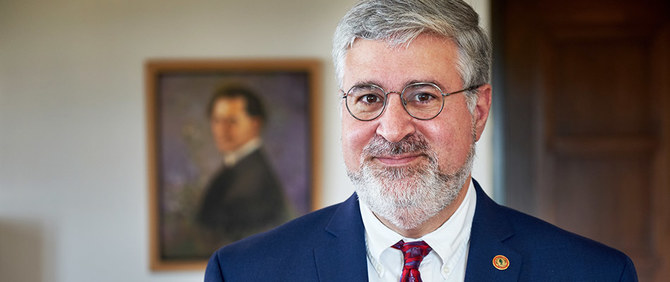DUBAI: The evolution of modern liberal Arab thought will be seriously at risk if the American University of Beirut (AUB) is unable to withstand the combined impact of Lebanon’s economic meltdown and the coronavirus pandemic.
The grim warning was sounded by none other than the AUB’s president, Dr. Fadlo Khuri, in an exclusive interview from Beirut with Arab News via Zoom.
One of the Arab world’s oldest universities, the AUB is facing its most serious crisis since its foundation, suffering massive losses and forced to cut staff.
The AUB has produced leading regional figures in medicine, law, science and art as well as political leaders and scholars over the decades including prime ministers.
“There’s nothing like us,” Khuri said. “There is no (similar) liberal arts institution that really brings the full impact of Western liberal thought that’s also open to Eastern thought, like AUB.”
A total of 63 percent of top-tier impact publications come from the AUB. “So, it’s critical that AUB not only survives, but thrives in the region,” he said.
“Otherwise, the region and the evolution of modern liberal Arab thought will be seriously at risk.”
Khuri described the current situation as a perfect storm with social, economic and political aspects.
“Temporary sacrifices will have to be made as the implosion of Lebanon’s economy poses a fundamental challenge,” he said.
“Lebanon has been living beyond its means as a country for a while and we’ve been concerned about this. Post-war, this wasn’t addressed,” Khuri said.
In these trying times, funds are critical, he said, adding that the AUB has so far received a $2.5 million grant from the US government to offset the problems in the wake of the coronavirus crisis.
Much of it will be used for the university and the rest will be distributed to private hospitals, he told Arab News.
Meanwhile, more than 300 of AUB’s alumni have come to the rescue after an appeal for funds was made, providing over $60,000.
“Our community has been, and will continue to be, generous but at some point, we need federal assistance from the two governments,” he said.
However, the Lebanese government has not yet come forward with any help, unlike during the civil war in 1975, when it provided 18 million Lebanese pounds in assistance that saved the university from closing.
“We’re in a much better financial situation now but the Lebanese government owes us a lot of money and they have not paid it,” Khuri said, adding that more than $150 million is owed to the AUBMC (the American University of Beirut Medical Center).
Khuri said he had no doubt that the institution will survive the pandemic and flourish for another 154 years and beyond, noting that it has withstood immense pressures in its storied history.
“They blew up the College Hall building and AUB survived,” he said. “A president was killed, and another kidnapped, and AUB survived. So unequivocally, AUB will survive.”
The question, according to him, is that having survived, what type of an AUB would emerge.
“For 30 years, we have built a remarkable, gifted and effective research faculty and mission along with teaching services,” he said.
“Now, Lebanon is collapsing economically, and the world is entering into probably the deepest recession and the first true depression since the late 1920s-early 1930s.”
Despite the looming challenges, the university strives to be a good role model and a good global and local citizen and as such, long-term steps, to do with restructuring and becoming more efficient, have to be taken, he said.

The American University of Beirut is one of the oldest universities in the Arab World (Courtsey of AUB)
New reports have scrutinized the viability of AUB’s graduate programs and whether they serve their long-term purpose and produce citizen leaders for the region.
There are 96 different nationalities currently in the university’s programs. “We have to look at whether we are inclusive, egalitarian and empowering enough [while] educating them,” Khuri said.
The Arab world and the whole region have never needed AUB to thrive more than it has till today, since its founding and the first world war, Khuri told Arab News.
Although distance learning has become the global norm, Khuri does not envision it exclusively as a long-term solution.
“Long-term, higher education has to evolve, much more quickly than it has, so it encapsulates instructional, experiential and distance learning,” he said.
“It’s got to be a blend of all three.”
Looking to the future, he cannot envisage an Arab world without AUB at its heart.
“Even now, no institution contributes more high-quality research per faculty member than AUB,” Khuri said.
“AUB is … the Arab world’s landmark, a top-quality liberal arts research university, and it is in all of our interests that this institution thrives.”

















